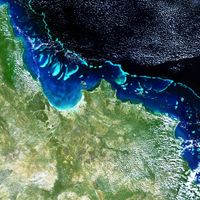NEJM -- Making Antimalarial Agents Available in Africa: "The Africa Malaria Report 2003 prepared by UNICEF2 paints a grim portrait of the continent that bears most of malaria's burden at the beginning of the 21st century. Despite 'intensified efforts to control the disease,' the report states, 'the number of children dying of malaria rose substantially in eastern and southern Africa during the first half of the past decade. . . . In West Africa . . . there was little change.' No country in sub-Saharan Africa had a 'substantial decline' in the disease. The culprit: the slow but imperturbable advance of chloroquine-resistant malaria across Africa. After decades of silently saving millions of lives, chloroquine — inexpensive, safe, and effective — is becoming impotent. One new class of antimalarial drugs, the artemisinins, could take its place.
The artemisinins are widely used in Asia, where resistance to chloroquine first emerged in the 1960s. After Chinese government scientists confirmed the antimalarial properties of compounds extracted from Artemisia annua (a plant known for centuries for its medicinal properties), companies in China and Vietnam began producing artemisinin-based drugs. But the African market did not develop, even when chloroquine's days were indisputably numbered."
A major barrier was cost. At their cheapest, artemisinins cost at least 10 times as much as chloroquine...
To add to the complexity of the situation, by the late 1990s, the leading authorities on malaria had endorsed the concept of combination therapy as the new standard. The prime motivation was to preserve the effectiveness of the artemisinins and other still-effective antimalarial partner drugs in artemisinin-based combination therapies...
One artemisinin-based combination therapy, artemether–lumefantrine (Coartem, Novartis), is currently being produced and has a wholesale price of $2.40 per adult course (reportedly with little or no profit margin), as compared with 10 cents retail for chloroquine. Other formulations should enter the market soon, with an expected decline in price to less than $1 for an adult course. At the lower level, the global cost of the drugs in artemisinin-based combination therapies would be on the order of $500 million per year — barely noticeable in the budget of any major developed country. Nevertheless, this is an unmanageable cost for countries with per capita incomes of $2,000 per year or less. Subsidies are needed, but how can they best be applied?...
The solution is to allow subsidies to enter at a high international level — at the top of the distribution chain. This requires that the producers of artemisinin-based combination therapies sell directly to some international agency. Then the agency, in turn, can resell to distributors — governments and private wholesalers — at very low prices, the difference being the subsidy. The drugs would then flow down to the end users through the same pathways as chloroquine now does, with the requisite profit margins being taken where the private sector now operates. If these drugs start at a very low price when they enter the supply chain and if their supply is adequate, the price to consumers should be about the same as the current price of chloroquine...
As simple as the Institute of Medicine's concept appears to be, it requires management of a type that acts. The great need is fortitude on the part of leading development-aid organizations; they have to depart from standard operating procedures. The Institute of Medicine's recommendation has gained some currency as a centerpiece in the highest levels of discussions about the financing of malaria treatment (with more meetings planned), but no commitments have been made to adopt it.





